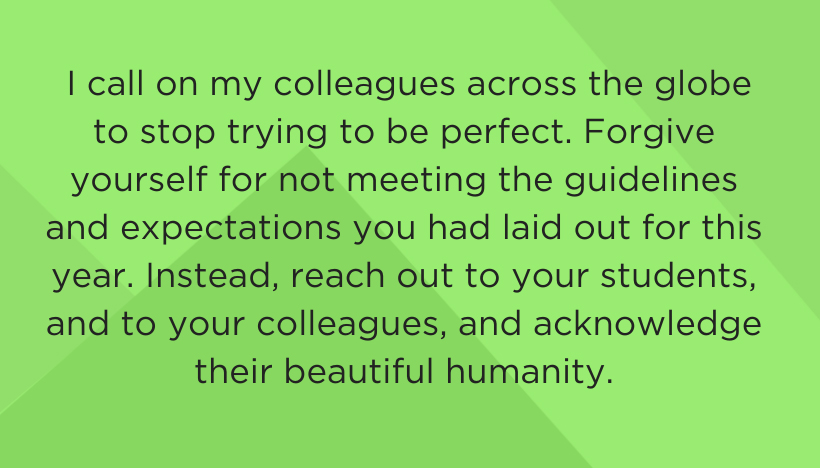This post was written by NCTE member Allison Bass-Riccio.
Lately, I find myself asking, is this really my new normal?
Each day I stare into Zoom, searching for some excitement in my students’ eyes, some spark of joy, of recognition, a sign that I am reaching them.
The specific day brings about various reactions: sometimes my high schoolers are angry, angsty teens, grieving what the world has taken from them; other days they are hopeful; often they seem shell-shocked, staring out of their little zoom box into the virtual abyss. They are here for the motions; in truth, the same reason I am here– for some sort of connection, some type of assurance that soon things will be normal again. I know I cannot give them what they want, and I wonder how long can we live like this? I strive not to feel stifled by the literal and symbolic boundaries of those zoom boxes.
I spend most days teaching, researching, attending webinars and meetings. I try to sprinkle self-care in, but I sometimes get lost in my thoughts. I find myself scrolling through facebook, news apps, or twitter, usually overwhelmed with dismay and despair. When that happens, my mind goes to my students. Where are they right now? Who are they around? What is happening with their families? Do their parents still have jobs? Are their families healthy?
I am profoundly aware of the responsibility I have with these high schoolers: these students whose brains are still rapidly developing. My list of what I need to do is long and heart-wrenching. The simple part is teaching them reading and writing, but other needs include modeling kindness, being vulnerable with my students, demonstrating self-care, remaining positive, being on the lookout for students in distress, exemplifying compassion, providing suggestions for healthy coping mechanisms, proferring a framework for anti-racist education, all while maintaining appropriate professional boundaries. Ultimately, I am trying to affirm their dark emotions, while providing an alternate outlook of hope.
The thing about teaching is this: it is a humanizing profession. We are often the face of the world to our students. We are the ones they look to, even if they would never admit that. But they need to be seen by us. And we, as teachers, do see them. We see our students for who they are. We celebrate their successes and hold them accountable to be better. And they in turn do that for us as well.
I recall the night in mid-March before our school launched our remote learning plan. There my department was- in a virtual room, looking traumatized and exhausted.But we were also ready to take what we had learned in a mere four days and recreate our curricula, not knowing if our students would show up, if they were safe, if they were home or traveling.
My department chair, who is the embodiment of strength and vulnerability, said to us, “Just remember, tomorrow you will go into that virtual room and you will be making history. History will remember that it was the teachers who were there to help the children through this.”
So I say to my students each morning, “I see you. I see who you are and how you are and I am here with you through this.”
Today, I call on my colleagues across the globe to stop trying to be perfect. Forgive yourself for not meeting the guidelines and expectations you had laid out for this year. Instead, reach out to your students and to your colleagues, and acknowledge their beautiful humanity.
As English teachers, we have the opportunity to show how storytelling can be an act of acceptance, tolerance, love, and healing. Let us bring to the forefront issues of equity and inclusion, which are more important now than ever before. Let us model love and kindness for all of our students. Let us choose to make sure every student is seen. And most importantly, let us institute acts of tenderness for ourselves.

Allison Bass-Riccio teaches English literature at Cheshire Academy, an International Boarding School in Cheshire, Connecticut. Additionally, she is a faculty liaison for diversity, equity, and inclusion, and associate house head of a girls’ dorm on campus. Allison enjoys seeing her students thrive in and out of the classroom, and being a cheerleader for her daughter, husband, and step-kids.

